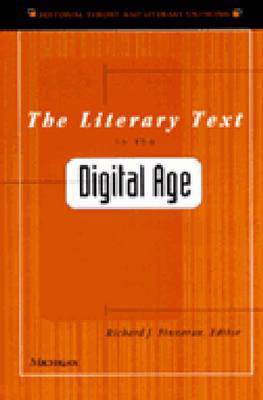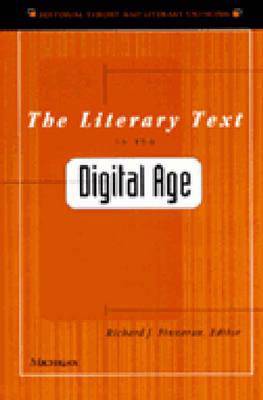
- Retrait gratuit dans votre magasin Club
- 7.000.000 titres dans notre catalogue
- Payer en toute sécurité
- Toujours un magasin près de chez vous
- Retrait gratuit dans votre magasin Club
- 7.000.0000 titres dans notre catalogue
- Payer en toute sécurité
- Toujours un magasin près de chez vous
The Literary Text in the Digital Age
152,95 €
+ 305 points
Description
The development of digital technology and its widespread availability on the personal computer are bringing about a fundamental paradigm shift in the ways that literary texts are created, preserved, disseminated, and studied--a revolution that many scholars have argued is as profound as that created by Gutenberg's invention of movable type. At the same time, a major shift in textual theory--away from the notion of a "Definitive Edition" and toward a recognition of the integrity of discrete versions--has highlighted the fundamental limitations of the printed book.
The Literary Text in the Digital Age addresses these developments from a wide range of perspectives. The essays discuss topics from the history of electronic editions to problems in encoding to the relationship between contemporary literary theory and the capabilities of digital technology. Other articles discuss the design of hypertext electronic editions now in progress or projected, including editions of the work of Chaucer, Thomas Hardy, and Dante Gabriel Rossetti. Individually and together these contributions show how such projects will go beyond the "electronic book" and exploit the full potential of the new medium. Finally, the volume also includes an afterword, in which A. Walton Litz reflects on the importance of digital technology from the perspective of one of the senior scholars in modern literary studies.
The essays gathered here are both authoritative and timely. This volume will be of interest to any student or scholar of literary texts, as well as those in any field concerned with the advent of digital technology and its transforming effects.
Contributors are Phillip E. Doss, Richard J. Finneran, Simon Gatrell, Susan Hockey, Ian Lancashire, John Lavagnino, A. Walton Litz, Jerome J. McGann, William H. O'Donnell, Peter Robinson, Charles L. Ross, Peter Shillingsburg, C. M. Sperberg-McQueen, Emily A. Thrush, and John Unsworth.
Richard J. Finneran is Hodges Chair of Excellence Professor of English, University of Tennessee at Knoxville.
The Literary Text in the Digital Age addresses these developments from a wide range of perspectives. The essays discuss topics from the history of electronic editions to problems in encoding to the relationship between contemporary literary theory and the capabilities of digital technology. Other articles discuss the design of hypertext electronic editions now in progress or projected, including editions of the work of Chaucer, Thomas Hardy, and Dante Gabriel Rossetti. Individually and together these contributions show how such projects will go beyond the "electronic book" and exploit the full potential of the new medium. Finally, the volume also includes an afterword, in which A. Walton Litz reflects on the importance of digital technology from the perspective of one of the senior scholars in modern literary studies.
The essays gathered here are both authoritative and timely. This volume will be of interest to any student or scholar of literary texts, as well as those in any field concerned with the advent of digital technology and its transforming effects.
Contributors are Phillip E. Doss, Richard J. Finneran, Simon Gatrell, Susan Hockey, Ian Lancashire, John Lavagnino, A. Walton Litz, Jerome J. McGann, William H. O'Donnell, Peter Robinson, Charles L. Ross, Peter Shillingsburg, C. M. Sperberg-McQueen, Emily A. Thrush, and John Unsworth.
Richard J. Finneran is Hodges Chair of Excellence Professor of English, University of Tennessee at Knoxville.
Spécifications
Parties prenantes
- Editeur:
Contenu
- Nombre de pages :
- 264
- Langue:
- Anglais
- Collection :
Caractéristiques
- EAN:
- 9780472106905
- Date de parution :
- 05-07-96
- Format:
- Livre relié
- Format numérique:
- Genaaid
- Dimensions :
- 160 mm x 236 mm
- Poids :
- 589 g

Les avis
Nous publions uniquement les avis qui respectent les conditions requises. Consultez nos conditions pour les avis.





